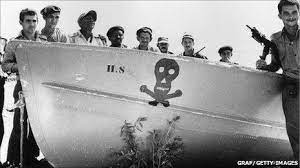In 1961, the Bay of Pigs invasion was a pivotal event in the history of Cuba and the United States, marking a failed attempt by a CIA-backed paramilitary group of Cuban exiles to overthrow the revolutionary government of Fidel Castro. The Bay of Pigs invasion, which took place on April 17, 1961, was a significant moment in the Cold War, exacerbating tensions between the United States and Cuba and shaping the course of U.S. foreign policy towards Latin America for decades to come. The origins of the Bay of Pigs invasion can be traced back to the Cuban Revolution of 1959, which brought Fidel Castro to power and led to the establishment of a socialist government in Cuba. The revolutionary government's close ties to the Soviet Union and its nationalization of American-owned assets in Cuba alarmed U.S. policymakers, who viewed Castro as a threat to American interests in the region. In response, the CIA devised a plan to train and equip a paramilitary force of Cuban exiles to launch a covert operation to overthrow Castro's government. The Bay of Pigs invasion was intended to be a swift and decisive operation to oust Castro from power and install a pro-American government in Cuba. However, the invasion quickly descended into chaos and failure, as Cuban forces loyal to Castro swiftly defeated the exiled invaders on the beaches of the Bay of Pigs. The paramilitary force, made up of poorly trained and ill-equipped fighters, was no match for the Cuban military, which had been forewarned of the impending attack and was prepared to defend the island against the invaders. The failure of the Bay of Pigs invasion was a humiliating defeat for the United States and a major setback for its efforts to undermine Castro's government and roll back the spread of communism in the Western Hemisphere. The botched operation exposed the weaknesses of U.S. intelligence and planning, as well as the limitations of covert action as a tool of foreign policy. The invasion also strained relations between the United States and Cuba, leading to a further deterioration of diplomatic ties and an escalation of hostilities between the two countries. The Bay of Pigs invasion had far-reaching consequences for Cuba, the United States, and the broader geopolitical landscape of the Cold War. In Cuba, the failed invasion bolstered Castro's grip on power and solidified his regime's anti-imperialist and anti-American stance. The invasion also served as a rallying cry for Cuban nationalism and unity, strengthening support for the revolution and reinforcing Castro's position as a revolutionary leader in the eyes of his people. In the United States, the Bay of Pigs invasion was a major embarrassment for the Kennedy administration, which had authorized and supported the operation as part of its efforts to contain communism in the Western Hemisphere. The failure of the invasion exposed divisions within the U.S. government and raised questions about the wisdom of covert interventions and regime change operations. The Bay of Pigs debacle prompted a reassessment of U.S. foreign policy towards Cuba and Latin America, leading to a shift towards more diplomatic and multilateral approaches to addressing regional challenges.
1961 Cuba Bay of Pigs
